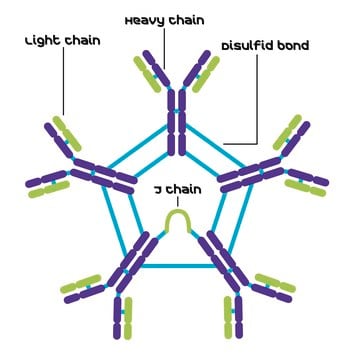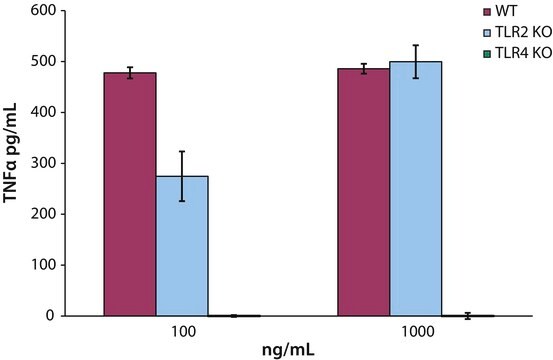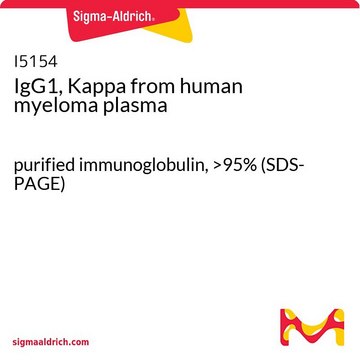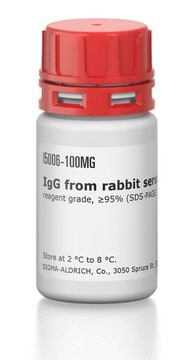M5909
IgM Isotype Control from murine myeloma
clone MOPC 104E, 200 μg/mL, buffered aqueous solution, purified immunoglobulin
Sinónimos:
Mouse IgM Isotype Control from myeloma
Iniciar sesiónpara Ver la Fijación de precios por contrato y de la organización
About This Item
Productos recomendados
biological source
mouse
Quality Level
conjugate
unconjugated
antibody form
purified immunoglobulin
clone
MOPC 104E, monoclonal
form
buffered aqueous solution
concentration
200 μg/mL
technique(s)
flow cytometry: suitable
isotype
IgMλ
shipped in
wet ice
storage temp.
2-8°C
target post-translational modification
unmodified
General description
IgM is a glycoprotein antibody that regulates humoral immune responses. Mouse IgM is involved in modulating B cell memory . This antibody isotype has also been implicated in the development of autoimmune responses associated with the pathogenesis of type 1 diabetes in mice . IgM isotype control antibody is specific for anti-mouse whole serum and anti-mouse IgM. The product does not react with antisera to mouse IgA, IgG1, IgG2a, IgG2b, and IgG3.
Isotype controls are non-reactive immunoglobulins of the same isotype as the primary antibody being used in an application. It is recommended that a non-reactive immunoglobulin of the same isotype and concentration be included as a negative control for each monoclonal antibody reagent used in flow cytometry or other immunoassays.
The purified IgM Isotype Control clone MOPC 104E preparation is non-reactive with antisera to mouse IgA, IgG1, IgG2a, IgG2b, and IgG3. When evaluated in flow cytometry, the IgM Isotype Control did not stain human peripheral blood lymphocytes (PBLs). A FITC Goat anti-Mouse IgM (μ-chain specific), Affinity Isolated Antibody (Product No. F 9259) along with 1 μg of the product was incubated with human PBLs and then evaluated by flow cytometry.
Application
IgM Isotype Control clone MOPC 104E is recommended as a negative control in flow cytometry. Working Concentration: equal concentrations of isotype control and primary antibody are recommended for use in flow cytometry. Equal concentrations of isotype control and primary antibody are recommended for use in flow cytometry.
IgM Isotype Control from murine myeloma has been used:
- in chromatin immunoprecipitation (ChIP) assay
- LABScreen assays
- immunofluorescent staining
IgM isotype control antibodies are suitable for use in immunohistochemistry .
Principle
The specificity of staining by monoclonal antibodies to mouse CD antigens should be verified by establishing the non-specific reagent binding to the target cell population. It is recommended that a concentration and isotype matched mouse myeloma immunoglobulin be included as a negative control for each monoclonal antibody reagent used in the immunoassay procedure.
Sigma Mouse Isotype Controls are supplied to match the concentration of Sigma purified and/or conjugated monoclonal antibodies to CD antigens. DUAL-TAG controls contain 100 μg of each conjugate.
Sigma Mouse Isotype Controls are supplied to match the concentration of Sigma purified and/or conjugated monoclonal antibodies to CD antigens. DUAL-TAG controls contain 100 μg of each conjugate.
Physical form
Solution in 0.01 M phosphate buffered saline, pH 7.4, containing 1% bovine serum albumin and 15 mM sodium azide
Disclaimer
Unless otherwise stated in our catalog or other company documentation accompanying the product(s), our products are intended for research use only and are not to be used for any other purpose, which includes but is not limited to, unauthorized commercial uses, in vitro diagnostic uses, ex vivo or in vivo therapeutic uses or any type of consumption or application to humans or animals.
Storage Class
12 - Non Combustible Liquids
wgk_germany
WGK 1
flash_point_f
Not applicable
flash_point_c
Not applicable
Certificados de análisis (COA)
Busque Certificados de análisis (COA) introduciendo el número de lote del producto. Los números de lote se encuentran en la etiqueta del producto después de las palabras «Lot» o «Batch»
¿Ya tiene este producto?
Encuentre la documentación para los productos que ha comprado recientemente en la Biblioteca de documentos.
Graham Haddock et al.
Microbiology (Reading, England), 156(Pt 10), 3079-3084 (2010-07-10)
Human small and large intestinal tissue was used to study the interaction of Campylobacter jejuni with its target tissue. The strain used for the study was 81-176 (+pVir). Tissue was processed for scanning and transmission electron microscopy, and by immunohistochemistry
Histone H3 lysine 36 tri-methylation is established over the Xist promoter by antisense Tsix transcription and contributes to repressing Xist expression
Ohhata T, et al.
Molecular and cellular biology, MCB-00561 (2015)
HLA antibody identification with single antigen beads compared to conventional methods
El-Awar N, et al.
Human immunology, 66(9), 989-997 (2005)
Juliana Rizzo et al.
mSphere, 5(4) (2020-08-21)
Extracellular vesicles (EVs) are membranous compartments produced by yeast and mycelial forms of several fungal species. One of the difficulties in perceiving the role of EVs during the fungal life, and particularly in cell wall biogenesis, is caused by the
Marshall W Huston et al.
Molecular therapy : the journal of the American Society of Gene Therapy, 19(10), 1867-1877 (2011-07-14)
Clinical trials have demonstrated the potential of ex vivo hematopoietic stem cell gene therapy to treat X-linked severe combined immunodeficiency (SCID-X1) using γ-retroviral vectors, leading to immune system functionality in the majority of treated patients without pretransplant conditioning. The success
Nuestro equipo de científicos tiene experiencia en todas las áreas de investigación: Ciencias de la vida, Ciencia de los materiales, Síntesis química, Cromatografía, Analítica y muchas otras.
Póngase en contacto con el Servicio técnico








